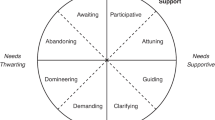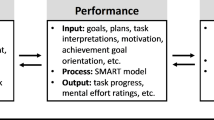Abstract
This article explores the opportunities to apply cognitive load theory and four-component instructional design to self-directed learning. Learning tasks are defined as containing three elements: learners must (a) perform the tasks, (b) assess their task performance, and (c) select future tasks for improving their performance. Principles to manage intrinsic and extraneous load for performing learning tasks, such as simple-to-complex ordering and fading-guidance strategies, are also applicable to assessing performance and selecting tasks. Moreover, principles to increase germane load, such as high variability and self-explanation prompts, are also applicable to assessment and selection. It is concluded that cognitive load theory and four-component instructional design provide a solid basis for a research program on self-directed learning.

Similar content being viewed by others

References
Ayres, P. (2006). Impact of reducing intrinsic cognitive load on learning in a mathematical domain. Applied Cognitive Psychology, 20, 287–298. doi:10.1002/acp.1245.
Boekaerts, M., & Cascallar, E. (2006). How far have we moved toward the integration of theory and practice in self-regulation? Educational Psychology Review, 18, 199–210. doi:10.1007/s10648-006-9013-4.
Bracken, D. W., Timmreck, C. W., Fleenor, J. W., & Summers, L. (2001). 360 feedback from another angle. Human Resource Management, 40, 3–20. doi:10.1002/hrm.4012.
Butler, D. L., & Winne, P. H. (1995). Feedback and self-regulated learning: A theoretical synthesis. Review of Educational Research, 65, 245–281.
Corbalan, G., Kester, L., & van Merriënboer, J. J. G. (2006). Towards a personalized task selection model with shared instructional control. Instructional Science, 34, 399–422. doi:10.1007/s11251-005-5774-2.
Corbalan, G., Kester, L., & van Merriënboer, J. J. G. (2008a). Combining shared control with variability over surface features: Effects on transfer test performance and task involvement. Computers in Human Behavior (in press).
Corbalan, G., Kester, L., & van Merriënboer, J. J. G. (2008b). Selecting learning tasks: Effects of adaptation and shared control on learning efficiency and task involvement. Contemporary Educational Psycholoy, 33, 733–756. doi:10.1016/j.cedpsych.2008.02.003.
Field, J. (2006). Lifelong learning and the new educational order, Stoke on Trent (2nd ed.). UK: Trentham books.
Kalyuga, S. (2006). Assessment of learners' organised knowledge structures in adaptive learning environments. Applied Cognitive Psychology, 20, 333–342. doi:10.1002/acp.1249.
Kester, L., Kirschner, P. A., & Corbalan, G. (2007). Designing support to facilitate learning in powerful electronic learning environments. Computers in Human Behavior, 23, 1047–1054. doi:10.1016/j.chb.2006.10.001.
Kicken, W., Brand-Gruwel, S., van Merriënboer, J. J. G., & Slot, W. (2008) Design and evaluation of a development portfolio: How to improve students’ self-directed learning skills? Instructional Science. doi:10.1007/s11251-008-9058-5.
Paas, F., & van Merriënboer, J. J. G. (1994). Variability of worked examples and transfer of geometrical problem-solving skills: A cognitive-load approach. Journal of Educational Psychology, 86, 122–133. doi:10.1037/0022-0663.86.1.122.
Paas, F., Tuovinen, J. E., van Merriënboer, J. J. G., & Darabi, A. (2005). A motivational perspective on the relation between mental effort and performance: Optimizing learner involvement in instruction. Educational Technology Research and Development, 53, 25–34. doi:10.1007/BF02504795.
Pollock, E., Chandler, P., & Sweller, J. (2002). Assimilating complex information. Learning and Instruction, 12, 61–86. doi:10.1016/S0959-4752(01)00016-0.
Quilici, J. L., & Mayer, R. E. (1996). Role of examples in how students learn to categorize statistics word problems. Journal of Educational Psychology, 88, 144–161. doi:10.1037/0022-0663.88.1.144.
Renkl, A. (1997). Learning from worked-out examples: A study on individual differences. Cognitive Science, 21, 1–29.
Renkl, A., & Atkinson, R. K. (2003). Structuring the transition from example study to problem solving in cognitive skill acquisition: A cognitive load perspective. Educational Psychologist, 38, 15–22. doi:10.1207/S15326985EP3801_3.
Salden, R. J. C. M., Paas, F., & van Merriënboer, J. J. G. (2006a). Personalised adaptive task selection in air traffic control: Effects on training efficiency and transfer. Learning and Instruction, 16, 350–362. doi:10.1016/j.learninstruc.2006.07.007.
Salden, R. J. C. M., Paas, F., & van Merriënboer, J. J. G. (2006b). A comparison of approaches to learning task selection in the training of complex cognitive skills. Computers in Human Behavior, 22, 321–333. doi:10.1016/j.chb.2004.06.003.
Sluijsmans, D. M. A., Moerkerke, G., van Merriënboer, J. J. G., & Dochy, F. J. R. C. (2001). Peer assessment in problem-based learning. Studies in Educational Evaluation, 27, 153–173. doi:10.1016/S0191-491X(01)00019-0.
Sluijsmans, D. M. A., Brand-Gruwel, S., & van Merriënboer, J. J. G. (2002). Peer assessment training in teacher education: Effects on performance and perceptions. Assessment & Evaluation in Higher Education, 27, 443–454. doi:10.1080/0260293022000009311.
Sluijsmans, D. M. A., Brand-Gruwel, S., van Merriënboer, J. J. G., & Bastiaens, T. (2003). The training of peer assessment skills to promote the development of reflection skills in teacher education. Studies in Educational Evaluation, 29, 23–42. doi:10.1016/S0191-491X(03)90003-4.
Sluijsmans, D. M. A., Brand-Gruwel, S., van Merriënboer, J. J. G., & Martens, R. (2004). Training teachers in peer-assessment skills: Effects on performance and perceptions. Innovations in Education and Training International, 41, 59–78.
Sluijsmans, D. M. A., Straetmans, G., & van Merriënboer, J. J. G. (2008). Integrating authentic assessment with competence-based learning in vocational education: The Protocol Portfolio Scoring. Journal of Vocational Education and Training, 60, 159–172. doi:10.1080/13636820802042438.
Stark, R., Mandl, H., Gruber, H., & Renkl, A. (2002). Conditions and effects of example elaboration. Learning and Instruction, 12, 39–60. doi:10.1016/S0959-4752(01)00015-9.
Sweller, J. (1988). Cognitive load during problem solving: Effect on learning. Cognitive Science, 12, 257–285.
Sweller, J., van Merriënboer, J. J. G., & Paas, F. (1998). Cognitive architecture and instructional design. Educational Psychology Review, 10, 251–296. doi:10.1023/A:1022193728205.
Van den Boom, G., Paas, F., & van Merriënboer, J. J. G. (2004). Reflection prompts and tutor feedback in a web based learning environment: Effects on students’ self-regulated learning competence. Computers in Human Behavior, 20, 551–567. doi:10.1016/j.chb.2003.10.001.
Van den Boom, G., Paas, F., & van Merriënboer, J. J. G. (2007). Effects of elicited reflections combined with tutor or peer feedback on self-regulated learning and learning outcomes. Learning and Instruction, 17, 532–548. doi:10.1016/j.learninstruc.2007.09.003.
Van der Klink, M., Gielen, E., & Nauta, C. (2001). Supervisory support as a major condition to enhance transfer. International Journal of Training and Development, 5, 52–63. doi:10.1111/1468-2419.00121.
Van Merriënboer, J. J. G. (1997). Training complex cognitive skills. Englewood Cliffs, NJ: Educational Technology Publications.
Van Merriënboer, J. J. G. (2007). Alternate models of instructional design: Holistic design approaches and complex learning. In R. A. Reiser, & J. V. Dempsey (Eds.), Trends and issues in instructional design and technology (pp. 72–81). Upper Saddle River, NJ: Pearson/Merrill Prentice Hall.
Van Merriënboer, J. J. G., & Kester, L. (2007). Whole-task models in education. In J. M. Spector, M. D. Merrill, J. J. G. van Merriënboer, & M. P. Driscoll (Eds.), Handbook of research on educational communications and technology, (pp. 441–456, 3rd ed.). Mahwah, NJ: Erlbaum/Routledge.
Van Merriënboer, J. J. G., & Kirschner, P. A. (2007). Ten steps to complex learning. Mahwah, NJ: Erlbaum/Routledge.
Van Merriënboer, J. J. G., & Sweller, J. (2005). Cognitive load theory and complex learning: Recent developments and future directions. Educational Psychology Review, 17, 147–177. doi:10.1007/s10648-005-3951-0.
Van Merriënboer, J. J. G., Jelsma, O., & Paas, F. (1992). Training for reflective expertise: A four-component instructional design model for complex cognitive skills. Educational Technology Research and Development, 40, 23–43. doi:10.1007/BF02297047.
Van Merriënboer, J. J. G., Clark, R. E., & de Croock, M. B. M. (2002a). Blueprints for complex learning: The 4C/ID-model. Educational Technology Research and Development, 50, 39–64. doi:10.1007/BF02504993.
Van Merriënboer, J. J. G., Schuurman, J. G., de Croock, M. B. M., & Paas, F. (2002b). Redirecting learners’ attention during training: Effects on cognitive load, transfer test performance, and training efficiency. Learning and Instruction, 12, 11–37. doi:10.1016/S0959-4752(01)00020-2.
Van Merriënboer, J. J. G., Kirschner, P. A., & Kester, L. (2003). Taking the load of a learners' mind: Instructional design for complex learning. Educational Psychologist, 38, 5–13. doi:10.1207/S15326985EP3801_2.
Van Merriënboer, J. J. G., Kester, L., & Paas, F. (2006). Teaching complex rather than simple tasks: Balancing intrinsic and germane load to enhance transfer of learning. Applied Cognitive Psychology, 20, 343–352. doi:10.1002/acp.1250.
Zimmerman, B. J. (1990). Self-regulated learning and academic achievement: An overview. Educational Psychologist, 25, 3–17. doi:10.1207/s15326985ep2501_2.
Zimmerman, B. J. (2002). Becoming a self-regulated learner: An overview. Theory into Practice, 41, 64–71. doi:10.1207/s15430421tip4102_2.
Author information
Authors and Affiliations
Corresponding author
Rights and permissions
About this article
Cite this article
van Merriënboer, J.J.G., Sluijsmans, D.M.A. Toward a Synthesis of Cognitive Load Theory, Four-Component Instructional Design, and Self-Directed Learning. Educ Psychol Rev 21, 55–66 (2009). https://doi.org/10.1007/s10648-008-9092-5
Received:
Accepted:
Published:
Issue Date:
DOI: https://doi.org/10.1007/s10648-008-9092-5



